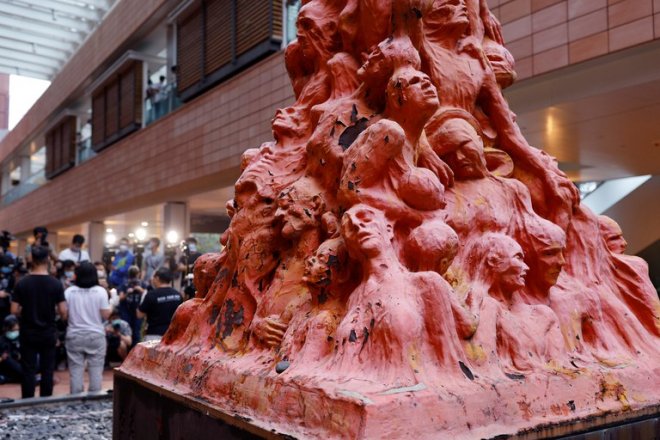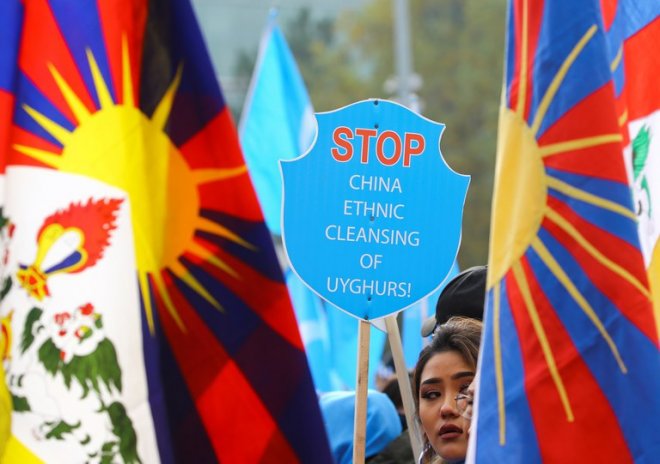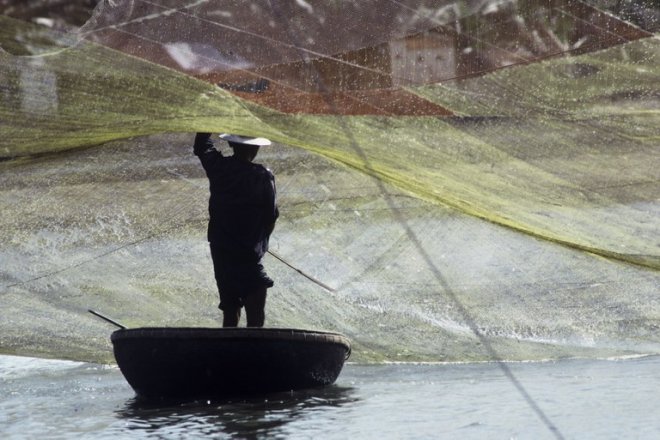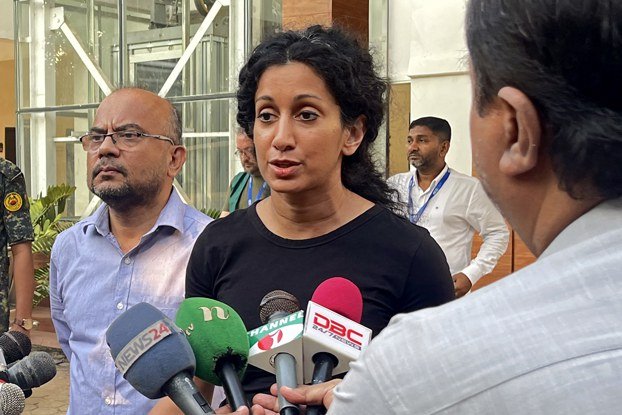‘Pillar of Shame’ sculptor says Hong Kong 'too dangerous' to visit
The Danish sculptor whose "Pillar of Shame" statue commemorating the 1989 Tiananmen massacre was seized by Hong Kong authorities said police in the city are harassing the relatives of people who work with him overseas.Jens Galschiøt also said that some European artists and politicians are wary of traveling to the city under the current crackdown on dissent.
Galschiøt has been trying to retrieve his artwork since it was removed from the University of Hong Kong in December 2021 and seized by Hong Kong national security police in May, said he would like to go to the city to get it back, but that this is currently "impossible."
"I really want to go to Hong Kong to meet some of my friends there, but I don"t think it"s possible," he said, adding that he has – like U.S. photographer Matthew Connors – previously been denied entry to the city, and that the Hong Kong government"s stance towards him is "extremely aggressive."
Hong Kong security chief Chris Tang has declined to confirm whether media reports that there is a warrant out for Galschiøt"s arrest are true or not.
But he warned in August that artistic creations like the "Pillar of Shame” can sometimes be a "pretext" for those seeking to "endanger national security."
"Mainland China has taken over"
Speaking on a trip to democratic Taiwan, Galschiøt said the authorities seem to have decided he is out to make trouble, despite the fact that the sculpture was made a quarter of a century ago.
"They attack me the whole time ... and they attack the people I work together with in Europe," he said. "They say I am just making art to disturb [things] there, and they don"t think at all that we put this sculpture [there] 25 years ago."
"It"s a really, really strange situation ... that kind of shows the changes in in Hong Kong and this show that mainland China has taken over also in the court system, and the whole system," he said, in a reference to an ongoing crackdown on public criticism of the authorities under the 2020 National Security Law.
 Activists hold candles beside the "Pillar of Shame," mourning those who died during the June 4 military crackdown on the pro-democracy movement at Beijing"s Tiananmen Square in 1989, inside the campus of the University of Hong Kong, May 2, 2021. Credit: Tyrone Siu/Reuters
Activists hold candles beside the "Pillar of Shame," mourning those who died during the June 4 military crackdown on the pro-democracy movement at Beijing"s Tiananmen Square in 1989, inside the campus of the University of Hong Kong, May 2, 2021. Credit: Tyrone Siu/ReutersIn December 2021, authorities at the government-run University of Hong Kong removed the “Pillar of Shame” and placed it under guarded storage, saying they had taken "legal advice" regarding potential risks for the university under the new law.
Days later, authorities at the Chinese University of Hong Kong took down a 6.4-meter bronze replica of the "Goddess of Democracy" figure used in the Tiananmen Square protests, while Lingnan University removed or painted over two public art works commemorating the victims of the massacre.
Vigils banned
Annual vigils commemorating the 1989 massacre of unarmed civilians by the People"s Liberation Army have also been banned, with their organizers behind bars.
Galschiøt said things in Hong Kong "couldn"t be worse."
"I have a lot of people who they"re starting now to disturb their family," he said. "The people I work together with in Europe, were talking to me and I talked to the press, then they take the people in Hong Kong and ask the family the father, the brother, and say, "Oh, do you know what your brother is doing in Europe?""
"This is their way of doing it in Hong Kong at the moment. I"m quite surprised. I think it"s going really really quickly and too quickly," he said, blaming Beijing"s insistence on "smashing" the democracy movement with the national security law.
 Workers remove a part of the "Pillar of Shame" sculpture at the University of Hong Kong, Dec. 23, 2021. Credit: Tyrone Siu/Reuters
Workers remove a part of the "Pillar of Shame" sculpture at the University of Hong Kong, Dec. 23, 2021. Credit: Tyrone Siu/ReutersHe said he knows people who are wary of traveling to Hong Kong at all, where the national security law applies to words and actions committed anywhere in the world, and by people of any nationality.
"There are a lot of people in Europe who have canceled their trip to Hong Kong and are afraid to go there," Galschiøt said. "Both in the Chinese diaspora but also a lot of the European people are saying okay, we don"t go to Hong Kong – it"s too dangerous for us to go there."
"I know some people from the parliament in Denmark. They can"t go to Hong Kong because they"re afraid of getting arrested," he said.
The Chinese and Hong Kong governments have blamed recent waves of mass protest in Hong Kong on incitement by “hostile foreign forces” seeking to foment a “color revolution” – or democratic regime change – in the city.
In August, Chris Tang blamed the mass protest campaign in 2012 by students – some of them still in secondary school – against patriotic education in Hong Kong"s schools, the 2014 Occupy Central movement for fully democratic elections, the 2016 "fishball revolution" in Mong Kok and the 2019 movement against extradition to mainland China on the actions of "foreign forces."
Translated by Luisetta Mudie. Edited by Malcolm Foster.
[圖擷取自網路,如有疑問請私訊]
|
本篇 |
不想錯過? 請追蹤FB專頁! |
| 喜歡這篇嗎?快分享吧! |
相關文章
AsianNewsCast























